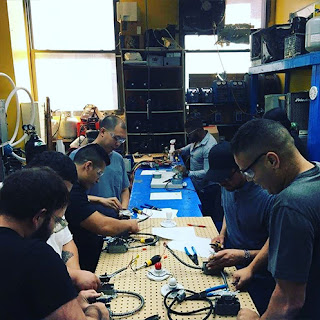Important Details You Need To Know About Refrigeration Engineering Course!
All over the world, the requirement for an HVAC technician with refrigeration certificates is rising as we speak. The refrigeration engineering course teaches students how to install, maintain, and repair refrigeration equipment, following all the latest trends and techniques. If you are not considering this career option as a viable and realistic option, then you will be surprised to know that a career in refrigeration engineering is not only ample in opportunities but also comes with a vast range of perks. So this is the high time for you to dive into this ever-growing industry and make a recession-free lucrative career.
Who is a refrigeration engineer?
In a refrigeration engineering course, you will learn about refrigeration system design, project planning, and business management. Refrigeration engineers create designs, oversee the fitment, and troubleshoot problems with complicated refrigeration systems for residential and commercial use, including healthcare facilities, restaurants, and insulated trucks. So if you are interested in having education and hands-on training in refrigeration engineering, thermodynamics, and the value of safety procedures, then a career in refrigeration engineering may be suitable for you.
Scope Of Studying Refrigeration Engineering Course:
Assemble and test refrigerators and air-conditioners in manufacturing companies
Installation & maintenance of centralized AC plants, cold storage, and many other business settings
Repairing and maintenance of refrigerators, air- conditioners, and water coolers
Sales of refrigerators, water coolers, and ACs
Electrical or refrigeration system maintenance in manufacturing companies
Before choosing this field, you must enroll in a reputed refrigeration engineering institute to get all the required knowledge and training from highly qualified instructors.
What are the eligibility criteria for the refrigeration engineering course?
Generally, there is no specific eligibility requirement for this course. Most training institutes accept all students from different social, economic, and educational backgrounds to join this course. Your age should be from 18 years to 65+ years. You can have a GED, TASC, High School Diploma, or College Degree. However, the most important criterion for this course is being highly motivated and should meet the minimum attendance requirement.
What Skills Can You Gain From Training At A Refrigeration engineering Institute?
At an accredited Refrigeration engineering Institute, you will learn how to move information into short-term memory and then move it into long-term memory. Our trained instructors will provide you with special techniques to tap into the 85% of your brain that most people do not know how to use. You can also learn the subject's language, including theory, all the engineering formulas, diagrams, etc. The refrigeration engineering course is divided into 4 seven-week sections as listed below-
Refrigeration & Systems Operation
In this section, you gain knowledge of the technical language and basic principles of Refrigeration, including Temperature Conversions, Pressure Conversions, Gas Laws, Heat Quantity, and Heat Transfer. In addition, our experienced instructor will train about Size, Pipes, Risers, and Tanks in Volume-, Cubic Feet and Gallons, and Weight - in Pounds of Water with Specific Gravity Conversion to any Substance.
Refrigeration Electrical
In this section, you will learn about basic Principles of Electricity, including Parallel and Series Circuits, Ohm’s Law, AC Impedance, Inductive Reactance, Capacitive Reactance, Phase Angle and Power Factor, The Clamp-on Meter, how to take readings correctly and be able to anticipate the readings safely.
Charging & Recovery
In this section of the refrigeration engineering course, students will develop skill levels in using equipment such as Recovery Machines, vacuum pumps, nitrogen cylinders, nitrogen regulators, mercury manometers, micron gauges, vacuum gauges, gauge manifolds, quick couplers & disconnects, charging cylinders and more.
Troubleshooting & Controls
In this segment, you can get in-depth knowledge of troubleshooting by applying the knowledge learned in the first half of the course to simulated service calls, systematically pinpointing the problem, determining the reason for the development of the problem, and handling the issue and repairing the system correctly.
Therefore, Refrigeration engineering is a recession-proof and interesting career option for those with an aptitude for learning the fundamentals and applications of refrigeration engineering. If you, too, wish to launch a lucrative career as a refrigeration technician, enroll in a career-focused Refrigeration engineering course offered by an accredited Refrigeration engineering institute.


Comments
Post a Comment